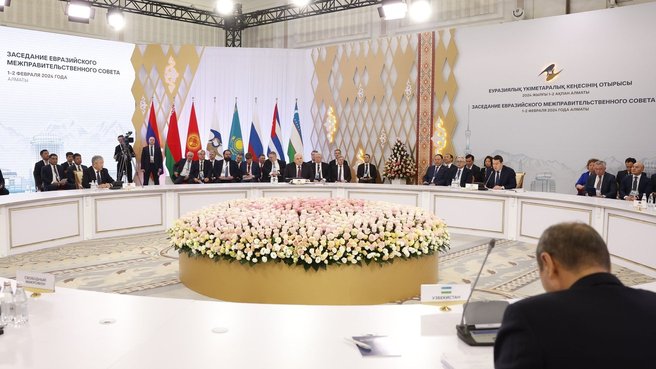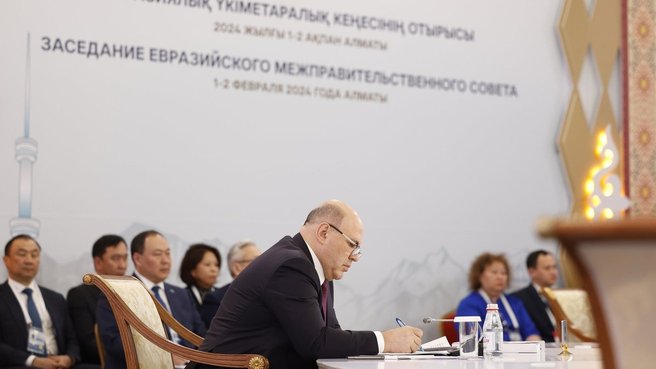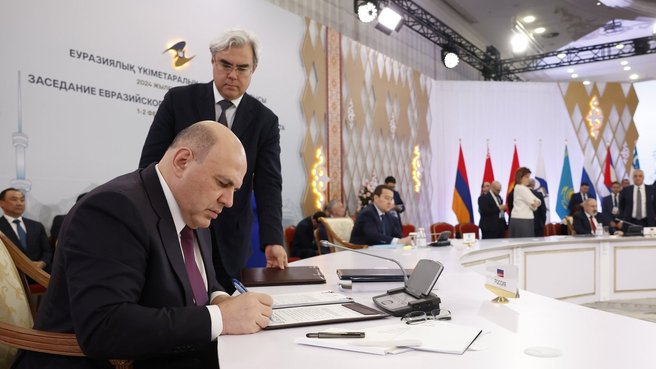The heads of government discussed current issues of Eurasian integration, including the functioning of the EAEU internal market, the implementation of joint transport projects, as well as the development of e-commerce. Particular attention was paid to the digital agenda, including improvement of the integrated information system in the EAEU.
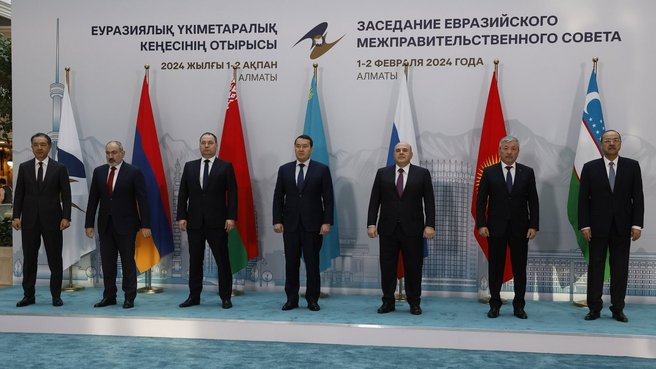
The heads of delegations taking part in the expanded meeting of the Eurasian Intergovernmental Council
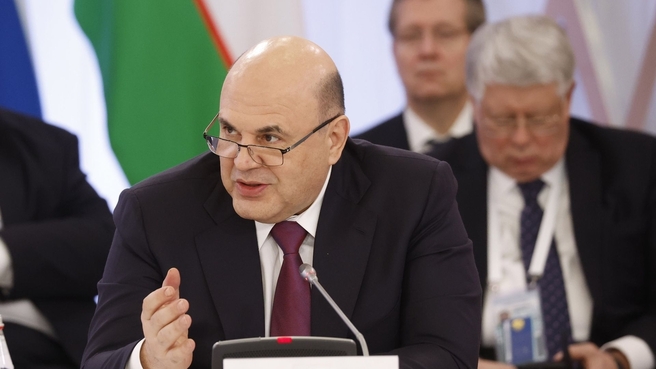
Mikhail Mishustin with Prime Minister of Armenia Nikol Pashinyan at the Eurasian Intergovernmental Council meeting
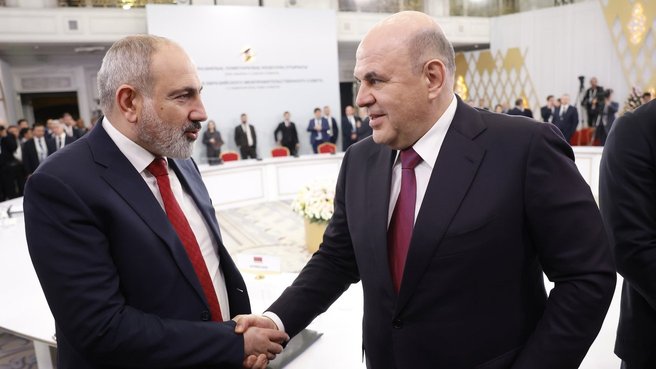
Mikhail Mishustin with Prime Minister of Armenia Nikol Pashinyan at the Eurasian Intergovernmental Council meeting
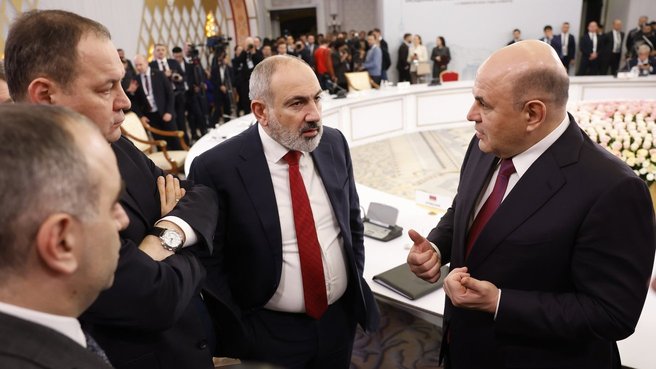
Mikhail Mishustin with Prime Minister of Armenia Nikol Pashinyan and Prime Minister of Belarus Roman Golovchenko at the Eurasian Intergovernmental Council meeting
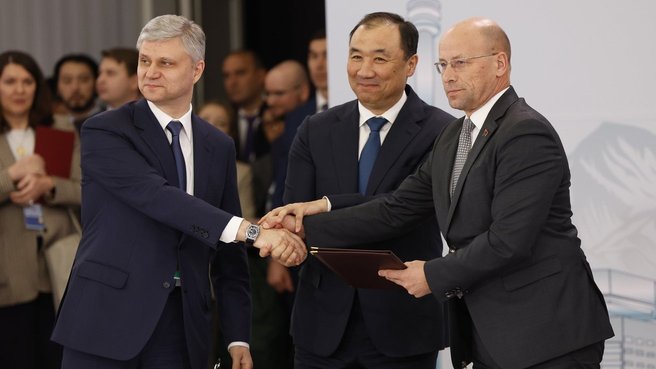
Oleg Belozerov, CEO and Chairman of the Management Board of Russian Railways, Nurlan Sauranbayev, Chairman of the Management Board of Kazakhstan Temir Zholy National Company, and Vladimir Morozov, Head of Belarusian Railways, during the signing ceremony for the Memorandum of Commitment to the Harmonised Development of the Transport and Logistics Potential of Railway Transport in the EAEU Member States
Eurasian Intergovernmental Council expanded meeting
List of heads of delegations at the Eurasian Intergovernmental Council expanded meeting:
Prime Minister of the Republic of Armenia, Chair of the Eurasian Intergovernmental Council Nikol Pashinyan;
Prime Minister of the Republic of Belarus Roman Golovchenko;
Prime Minister of the Republic of Kazakhstan Alikhan Smailov;
First Deputy Prime Minister of the Kyrgyz Republic Adylbek Kasymaliev;
Prime Minister of the Russian Federation Mikhail Mishustin;
Prime Minister of the Republic of Cuba, Manuel Marrero Cruz;
Prime Minister of the Republic of Uzbekistan Abdulla Aripov;
Chairman of the Eurasian Economic Commission Board Bakytzhan Sagintayev.
Mikhail Mishustin’s remarks:
Good afternoon, everyone, once again.
I am happy to welcome all of you to this year’s first Eurasian Intergovernmental Council meeting. I would like to join in saying the words of gratitude to our Kazakhstani colleagues and partners. Mr Smailov, I would like to thank you personally for the warm welcome and excellent organisation of the Intergovernmental Council meeting and the Digital Almaty forum and exhibition.
Armenia assumed the chairmanship of the union in January. Mr Pashinyan, I wish our Armenian colleagues success. We have carefully studied the integration development priorities that you have outlined. They show continuity and largely overlap with Russia’s position. We stand ready to help you implement them.
By all means, I wish productive work to the chairman of the board, Mr Sagintayev, whom you know well. Since we have new board members, I wish all of you good luck and every success in your work. I am absolutely certain that your personal experience and knowledge will help promote cooperation among the five member countries and effectively achieve the commission’s goals for the benefit of our peoples.
Colleagues,
The union will mark 10 years of the signing of the treaty soon. Over this time, it has proven its ability to adapt to the changing international circumstances and to make progress amid a turbulent global economy. I think few could imagine the kind of challenges we would face when we created this union.
President Vladimir Putin noted that “our association consistently asserts itself as an independent and self-sufficient centre in the emerging multipolar world.”
The union’s GDP grew by approximately 3.5 percent in 11 months of 2023. Industrial output grew 4 percent, construction almost 8.5 percent, passenger transport increased significantly at about 13 percent, and retail trade was up by over 6 percent.
These results were achieved, in part, by intensive coordinated efforts to support our respective economies. I’m talking about the implementation of a set of measures to that effect, most of which have already been completed, as well as steps to ensure the free movement of goods, services, investment, and labour. For example, last year, ten barriers, six barrier-like obstacles, and one restriction on the common market were removed.
It is essential to prioritise economic development goals going forward. The complementarity of the five union countries allows us to set ambitious goals, primarily to improve the quality of life of our people, and to improve the business environment across the entire Eurasian space. It goes without saying that we must leverage the advantages offered by integration.
We are guided in our work by the Eurasian Economic Path Declaration signed by the leaders of the five countries in St Petersburg in December which calls for expanding cooperation in various areas, including the climate agenda, the AI systems, e-commerce, a common financial market, and increasing the share of national currencies in mutual transactions, which currently stands at about 90 percent and continues to grow.
We must begin implementing the goals and objectives set by our leaders in this strategic document as soon as possible.
I will briefly go over the issues which, I believe, need our special attention, primarily expanding the technological capabilities of our five countries. Mr Golovchenko covered this in his remarks.
Much has been accomplished to date. We have agreed on funding the industrial cooperation projects from the union budget. Our leaders approved this mechanism at the May summit. Mr Golovchenko mentioned that it provided for subsidised funding of economic projects involving three or more union member states. We should start working on this programme soon and ensure the opening of innovative plants that make products that enjoy high demand.
It is also crucial – we discussed this in detail – to create a unified transport system across Eurasia, to form a new logistics infrastructure, and to establish seamless and safe international routes.
We appreciate our partners’ cooperation on this ‘track.’
Russia is actively developing the North-South International Transport Corridor and expanding transit capacity in the eastern direction towards China, Southeast Asia and the Asia-Pacific region. We are also working on improving transit capacity in the northwestern direction.
By the way, 2023 set a record in terms of road construction. Over 650 kilometres of federal and regional roads were built, which is three times more than in 2022.
I would like to highlight the project to expedite agricultural shipping, the Eurasian Agro-express. Last year, over 450,000 tonnes of cargo were shipped. Additional agricultural hubs and the trade and logistics centres that are now being built along the routes, will help us boost shipping capacity.
Today, the national railway companies of Russia, Belarus and Kazakhstan will sign a very important document: a Memorandum of Commitment to the Harmonised Development of the Transport and Logistics Potential of Railway Transport in the EAEU Member States.
We hope that this will help increase the share of cargo shipping services on the global market and the volume of shipped goods along trans-Eurasian corridors.
We see good prospects for joint work on the digital agenda. Actually, we gathered at a digital forum in Almaty and exchanged opinions in details on this topic during the Digital Almaty forum. I would like to note again that the union needs to develop the integrated information system more actively to provide for uninterrupted interaction between our authorised agencies.
Esteemed colleagues,
As President of Russia Vladimir Putin said at the December summit in St Petersburg, “as the EAEU’s authority and economic weight grows, an increasing number of countries and international organisations are showing interest in establishing mutually beneficial contacts with the EAEU.”
Ties with regional associations, such as our partners in the SCO and ASEAN, are expanding.
Last year, a free trade agreement was signed with Iran. Its implementation will provide our companies with ample opportunities to engage in market exports to this country. We need to speed up the procedures that are required for the document to come into force. Negotiations are underway on a temporary agreement on free trade with Mongolia, as well as on improving the existing agreement with Vietnam. Significant headway has been achieved in the dialogue with Egypt. Discussions are in progress with the United Arab Emirates and Indonesia. This takes on special significance as Eurasian trade routes pivot towards the most promising and premium markets, notably those of the friendly states.
The union’s interaction with China is also being improved. We need to use every effort to provide for the successful implementation of measures outlined in the relevant roadmap on the development of economic cooperation with our Chinese friends.
Colleagues,
The Eurasian integration project is a crucial strategic project for every one of our countries. I am confident that we can bring our partnership to an even higher level and reach success in all areas by working together. What is most important, we can create a favourable environment both for our people and businesses and improve the quality of life for the people in the EAEU member states.
